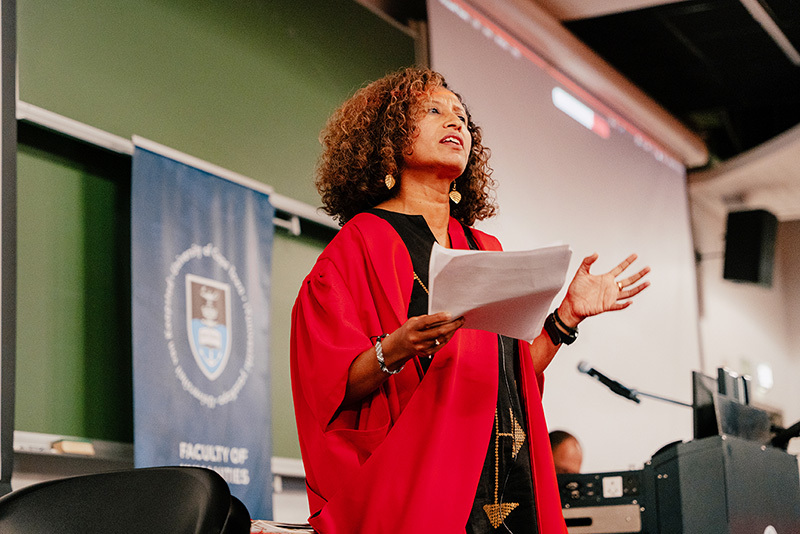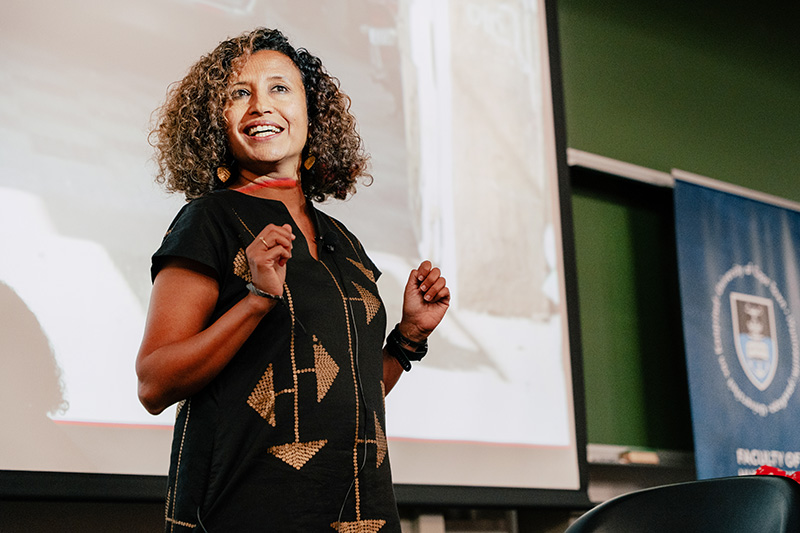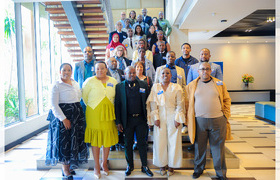Staging the baby business
20 October 2025 | Story Kamva Somdyala. Photos Robyn Walker. Read time 4 min.
A mix of performance and conversation marked Professor Amrita Pande’s inaugural lecture, “White Eggs, Black Wombs: Staging the Baby Business”, on Wednesday, 15 October, at the University of Cape Town (UCT).
Professor Pande, a respected professor of sociology, presented education on how assisted reproductive technologies have transformed reproduction into a global marketplace. She shared poignant reflections from work done across the globe and shone a spotlight on unchecked forms of labour involved in egg donation and surrogacy.
She presented to the audience what she calls the “global fertility industry”. “With the growth in assisted reproductive technologies (ART), the assumption that conception is about one man, one woman and sexual intercourse has been completely disrupted,” said Pande. “The making of a baby has become an enterprise with a market for every possible related service. In the past decade, these technologies and markets have taken a global, southern turn, partly because of cost considerations but also restrictive laws in some parts of the world.
“Patients, clients or what we call intending parents now travel across the world to get a genetically related baby or even a baby customised to their preferences. The task of reproducing a baby is divided into neat segments, which can be outsourced to various service providers in different parts of the world.”
Pande used her lecture to retell some of the conversations she had with women during her studies. It was a mix of intimate conversations held in hospital waiting rooms and one-on-one stories.
“Reproductive technologies and repro-genetic technologies are a set of technologies which are very quickly becoming mundane and normalised.”
This industry connects not just a baby with its intended parents, but also fertility professionals, brokers, corporations, investors, and even courier services for transferring embryos. Over the past two decades, Pande has conducted a “mobile ethnography” across fertility clinics in India, Cambodia, Ghana and South Africa.
Said Pande: “It is interesting, although not surprising, that the two postcolonial nations, South Africa and India, have become hubs for reproductive tourism. Both have increasing investment in cutting edge technology, and ‘five-star luxury hospitals’ that often aim to cater primarily to the national elite and international clients, mostly from the Global North.
“Lately there is a growing trend of young white South African women flying to fertility hubs to provide their eggs and fulfil the need for making white babies for cheap in the global fertility market.”
This has led to racialised desires.
“The complex entanglements in this narrative cannot be understood as a simple black and white binary,” noted Pande. Lately, Pande’s interest in these reproductive or birth technologies has led her to explore the other side of the coin: technologies of death.

“Reproductive technologies and repro-genetic technologies are a set of technologies which are very quickly becoming mundane and normalised. They erase not through visible warfare, but through the logic of perfectibility. These are not dramatic acts of killing, but subtler decisions that determine who is allowed to exist and who is pre-emptively excluded. The question is no longer only who dies, but who is never born.”
Critique of perfectibility
She added: “I want to be clear: my critique is not directed at all forms of interventions – those designed to alleviate suffering, manage chronic illness, or provide dignity and relief for those living with debilitating conditions are technologies of care.
“But I draw a sharp distinction between these therapeutic uses and the growing investment in repro-genetic interventions: technologies that promise to diagnose, screen and potentially edit the future by selecting out certain traits, bodies, or lives altogether. These are not merely scientific choices – they are definite declarations about whose futures are worth investing in, and whose lives are imagined as deletable.”
Pande concluded: “It is in these spaces – where suffering is no longer treated but pre-emptively deleted – that I locate my critique of perfectibility. When perfection becomes a precondition for birth, what happens to the humanity that some of us still hold dear?”
 This work is licensed under a Creative Commons Attribution-NoDerivatives 4.0 International License.
This work is licensed under a Creative Commons Attribution-NoDerivatives 4.0 International License.
Please view the republishing articles page for more information.










